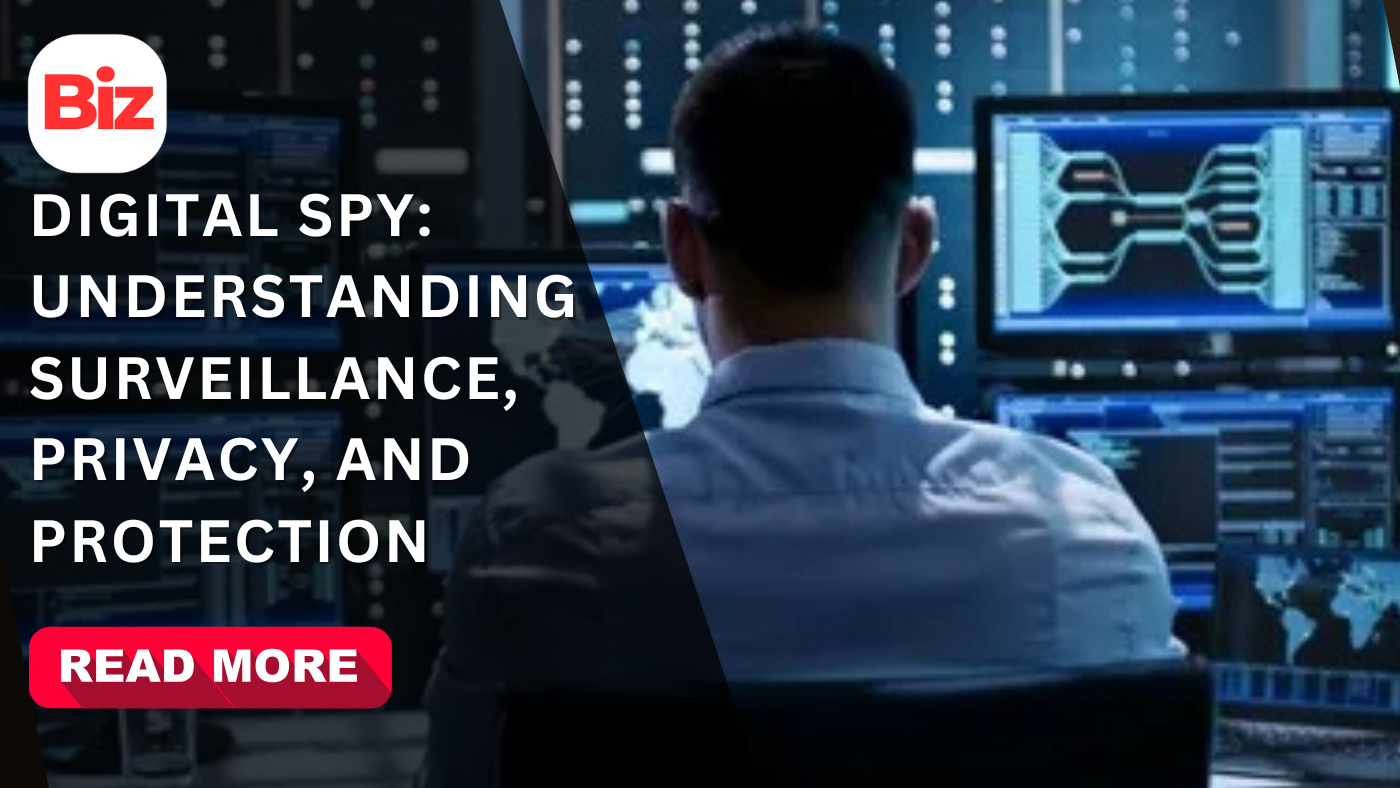- The Legal Framework: Spying by Whom in the UK?
- Privacy Digital Surveillance: The Secret Menace.
- Red flags You are a potential victim of a computer spy.
- The Digital Spy Playbook: The Mainstream Techniques.
- Digital Spy vs. Digital Spy Strictly Forum: When Surveillance Strictly Intersects Pop Culture.
- Protecting Yourself against Digital Spying.
- Digital Spying Reporting in the UK.
- The Future of Digital Spying
- Conclusion
In the modern world which is highly connected, the word digital spy cannot be used only when referring to the James Bond movies or the technologically sophisticated thriller. In the United Kingdom, digital spying encompasses governmental surveillance under the Investigatory Powers Act, insidious hackers taking personal data, even intimate partner surveillance using so-called stalker ware. To an average individual, it is becoming more and more relevant to learn about the mechanics of surveillance, and how to guard against it.
This blog goes into great depth into digital spying in UK, the legal provisions, the tools the spies and the criminals use, indications that your devices might be compromised and effective measures to protect your online life. In passing we shall also briefly mention how such terms as digital spy are strictly forum, which originally pertained to the discussion communities within the entertainment field, indicating how even the internet has erased the distinction between information, gossip, and surveillance.
The Legal Framework: Spying by Whom in the UK?
Surveillance is no longer the affair of shorthand hackers in dark cellars in the UK. Investigatory powers Act 2016 (IPA) gives wide powers to government agencies. The act, also commonly referred to as the Snoopers Charter, empowers agencies like MI5, MI6, GCHQ, and the police to monitor communications, engage in what is known as equipments interference (hackings), and store communications information.
These authorities are warrantable and are under the check of the Investigatory Powers Commissioner Office (IPCO). Nevertheless, civil liberties organizations have claimed that mass surveillance is bulk data collection. A number of suits have been taken to the European Court of Human Rights and there is a question that whether there is fairness in striking a balance between national security and individual privacy.
Together with the IPA, the Computer Misuse Act 1990 criminalises unauthorized access to computer systems, and thus makes hacking back or spying privately illegal.
Thus, state surveillance is controlled (although debatably so), but it is evident that privatized digital surveillance by individuals, stalkers, and criminals is an illegal activity.
Privacy Digital Surveillance: The Secret Menace.
Although government surveillance makes the news, most individuals will face more chances of being spied upon digitally by:
- Cybercriminals, hackers, and thieves of all types stealing their logins, bank accounts, or selling their personal information.
- Intimate partner surveillance, as stalkerware apps that are installed on phones or computers and used to track messages, calls, and location.
- Corporate espionage Corporate espionage refers to using spyware or phishing schemes to steal trade secrets against a business.
The equipment of the digital spy is more and more available. Commercial stalkerware software may be readily purchased at a low price and installed within minutes and is commonly masked as parental monitoring software or employee monitoring software.
Red flags You are a potential victim of a computer spy.
Are you even aware that you are being spied on digitally? As such there is no giveaway, but there are a few red flags:
- Battery depletion and over heating- spyware is always running in the background.
- There is high data use – data being sent in large quantities without your awareness.
- Unknown applications Programs you cannot recall installing.
- Abnormal permissions- applications that have been previously installed have the sudden permission to access camera, microphone, or GPS.
- Unsent messages – friends get weird texts or emails posted by you.
- Microphone or camera problems- flickering lights, gadgets that start without any reason.
When you observe more than one of these signs, it is worth looking into it.
The Digital Spy Playbook: The Mainstream Techniques.
There are numerous tools and techniques that are utilized by digital spies. These include:
- Phishing e-mails – deception into clicking bad links.
- Keyloggers – application which captures all keystrokes.
- Remote Access Trojans (RATs) – malware that provides the complete control of your device.
- Stalkerware – applications on phones that monitor the movement, conversations, and browsing.
- Wi-Fi eavesdropping Wi-Fi eavesdropping involves capturing unencrypted data over a public Wi-Fi.
Learning about spy techniques will make you familiar with the dangers that can be found in the day-to-day life.
Digital Spy vs. Digital Spy Strictly Forum: When Surveillance Strictly Intersects Pop Culture.
Intriguingly, there is also a digital spy in a completely different context, which is the UK entertainment website Digital Spy. It is most famous about television news, star gossip and vibrant forums such as the Digital Spy Strictly forum where fans share their views on each move, each turn on Strictly Come Dancing.
This crossover is symbolic. On one hand, digital spy is the darker side of surveillance, intrusion, and the privacy issues. The digital spy strictly forum, on the other, is a type of online community involving sharing of opinions, humour and connection. They both bring out the fact that the internet is the area where observation occurs at all times; either state, criminal or social.
The lesson? We are constantly under the surveillance of a hacker, an algorithm or even the other members of the forum who are reviewing the dance routine of a celebrity in the digital age.
Protecting Yourself against Digital Spying.
Although the threats are true, there are obvious measures that you can take to protect against digital spying:
Secure Your Accounts
- Use strong and distinct passwords to each service.
- Turn on the two-factor authentication (2FA) with the preference to the app and not the SMS.
- Frequently monitor login history of suspicious access.
Secure Your Devices
- Stay abreast with operating systems and applications.
- Install reliable anti-malware software.
- Keep applications permissions to the minimum.
- Encrypt and use secure lock screens.
Be Wary of Links and Apps
- Do not press suspicious links when using emails or texts.
- Installing apps in unofficial stores (Apple App Store, Google Play) is not allowed.
- Review check and allow installing.
Identify and eliminate Stalkerware.
- Search for unknown applications containing the word monitor, track or spy.
- Go through the settings of your phone to check abnormal accessibility of apps.
- In case of doubt, save the valuable files and reset the phone.
Encrypted Communication.
- The Signal app provides end-to-end encrypted messaging.
- Never talk about sensitive issues using insecure channels.
Stay Informed
- Adhere to UK advice at the National Cyber Security Centre (NCSC).
- Watch out on frauds reported by Action Fraud.
Digital Spying Reporting in the UK.
In case you suspect that you are the victim of digital spying, follow the following steps:
- Report to Action Fraud (the national cybercrime reporting centre in the United Kingdom).
- Report the case of harassment or stalking to the local police.
- Contact the Office of Information Commissioner (ICO) with any data privacy issues.
- Get professional assistance of organisations such as The Cyber Helpline that help people who experience online harassment or surveillance.
The Future of Digital Spying
The value of digital spying in the UK is changing at a high rate. Surveillance becomes increasingly strong with the development of artificial intelligence and facial recognition as well as big data. Meanwhile, there is an increasing public discussion about the manner in which one should reconcile the privacy and security issue.
The digital spy strictly forum still can be the place of the heated discussion of the celebrity dance-offs, yet the discussions of the surveillance, the freedom and security versus the privacy and the protection, are going on in parliament, at the courts and in the society.
Conclusion
The digital spy is an official and unofficial cyber space, threatening and sometimes bizarrely normal in the UK. It is the hacker attempting to steal your identity, the stalker attempting to track movements using spyware and the state performing mass interception of communications.
And still, the term also makes us think of the online communities such as the digital spy strictly forum, and where viewing and commenting are engaged in as an element of entertainment, and not intrusion.
Our only hope as a community is to find a way to learn to move around this terrain prudently: how we can ensure our privacy is safeguarded, our devices are also secure, and we are also aware of the dangers and possibilities of the digital world.








